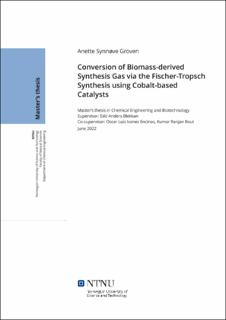| dc.contributor.advisor | Blekkan, Edd Anders | |
| dc.contributor.advisor | Ivanez Encinas, Oscar Luis | |
| dc.contributor.advisor | Rout, Kumar Ranjan | |
| dc.contributor.author | Groven, Anette Synnøve | |
| dc.date.accessioned | 2022-10-20T17:20:24Z | |
| dc.date.available | 2022-10-20T17:20:24Z | |
| dc.date.issued | 2022 | |
| dc.identifier | no.ntnu:inspera:111296605:37314039 | |
| dc.identifier.uri | https://hdl.handle.net/11250/3027422 | |
| dc.description.abstract | Dagens globale energiscenario og klimakrise motiverer utnyttelse av fornybare ressurser for å erstatte fossilt brensel. Biomasse er en av de mest lovende karbonnøytrale fornybare ressursene tilgjengelig for bærekraftig produksjon av biodrivstoff og viktige kjemikalier. Biodrivstoff kan lages fra en sekvens av prosesser hvor biomasse først er gassifisert til syntesegass for deretter å bli konvertert til drivstoff via den katalyserte Fischer-Tropsch-prosessen. Syntesegassen fra biomasse inneholder en rekke urenheter som kan forårsake komplikasjoner for den sensitive Fischer-Tropsch-katalysatoren. Fischer-Tropsch-syntesen produserer et bredt spekter av hydrokarboner, hvor en av dem er lette olefiner som er en av de mest essensielle kjemiske mellomproduktene for mange industrier.
I denne studien er effekten av bæremateriale, mangan-promotering og fosfor-kontaminering for kobolt-baserte Fischer-Tropsch-katalysatorer studert. Fosfor er en vanlig urenhet til stede i syntesegass fra biomasse, og mangan er en promoter som er blitt dokumentert å fremme produkt-selektiviteten til lette olefiner. Kobolt-katalysatorene i dette prosjektet var promotert med rhenium og mangan, og bærematerialene som ble brukt var γ-Al2O3 og to forskjellige SiO2-materialer. Alle katalysatorer ble syntetisert ved ''incipient wetness'' impregnering.
Katalysatoren med γ-Al2O3 som bæremateriale viste høyere fordeling av kobolt-atomer og bedre stabilitet sammenliknet med SiO2-katalysatorene. Katalysatorene med SiO2 viste høyere C5+ produkt selektivitet og høyere α-olefin/parafin forhold enn katalysatoren med γ-Al2O3. Dette kan være en indikasjon på at hydrogenerings-reaksjoner er hindret for kobolt på SiO2, som kan føre til høyere sannsynlighet for kjedevekst og høyere andel av olefiniske produkter. Tre katalysatorer med forskjellige mengder av mangan (1.5, 3.75 og 5wt%) med SiO2 som bæremateriale ble syntetisert og testet. Resultatene indikerte at produkt-selektiviteten til lette olefiner økte med økende mangan-promotering. Det ble også foreslått at et Mn/Co forhold på 0.1 øker aktiviteten til katalysatoren i henhold til CO-omdannelse. Fosfor (1700 og 6700 ppmw) ble introdusert til katalysatorer ex situ ved ''incipient wetness'' impregnering. Kontaminering av fosfor førte til en signifikant reduksjon i katalysator-aktiviteten og hadde en negativ innvirkning på egenskapene til kobolt-katalysatorene. | |
| dc.description.abstract | The current global energy scenario, as well as the threat of environmental destruction, encourages the use of renewable energy resources to replace fossil fuels. Biomass is one of the most promising carbon-neutral renewable resource for the sustainable production of biofuels and important chemicals. Biofuels can be made through a sequence of processes in which biomass is first gasified into synthesis gas and then converted into liquid fuels via the catalyzed Fischer-Tropsch process. The synthesis gas made from biomass contains a series of impurities that can cause complications for the sensitive Fischer-Tropsch catalyst. The Fischer-Tropsch synthesis produces a wide range of hydrocarbons, one of which is light olefins, the most essential chemical intermediate for multiple industries.
In this study, the effect of support material, manganese promotion, and phosphorous contamination on cobalt-based Fischer-Tropsch catalysts were investigated. Phosphorous is a common impurity present in biomass-derived synthesis gas, and manganese has been documented to improve light olefin product selectivity. The cobalt-based catalysts were promoted with rhenium and manganese, while the support materials used were γ-Al2O3 and two different SiO2-supports. All catalysts were synthesized by incipient wetness impregnation.
The γ-Al2O3-supported catalyst had higher cobalt dispersion and catalyst stability compared to the SiO2-supported catalysts. The SiO2-supported catalysts displayed higher C5+ product selectivity and higher α-olefin/paraffin ratios than the γ-Al2O3-supported catalyst, suggesting that hydrogenation reactions with cobalt supported on SiO2 are hindered, leading to a higher chain growth probability and higher quantity of olefinic products. Three different loadings of manganese (1.5, 3.75, and 5wt%) were tested on SiO2-supported catalysts, where light olefin selectivity increased with increased manganese promotion. It was also suggested that an Mn/Co ratio of 0.1 increases the CO conversion of the catalyst. Phosphorous (1700 and 6700 ppmw) was introduced ex-situ to the catalyst by incipient wetness impregnation. The phosphorous contamination significantly reduced the catalyst activity and negatively affected the properties of the cobalt catalyst. | |
| dc.language | eng | |
| dc.publisher | NTNU | |
| dc.title | Conversion of Biomass-derived Synthesis Gas via the Fischer-Tropsch Synthesis using Cobalt-based Catalysts | |
| dc.type | Master thesis | |
